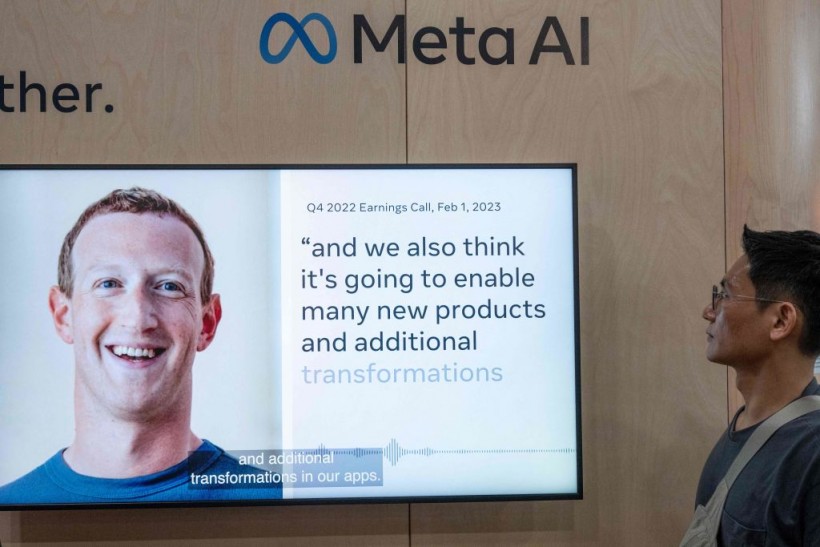Meta is reportedly in the process of developing an advanced artificial intelligence (AI) system that aims to rival OpenAI's most sophisticated model.
This move signifies Meta's ongoing commitment to harnessing the power of AI technology for various applications within its ecosystem.

(Photo : ALAIN JOCARD/AFP via Getty Images)
A visitor watches a Meta Platforms CEO Mark Zuckerberg speech on a screen at the Meta booth during the Vivatech technology startups and innovation fair at the Porte de Versailles exhibition centre in Paris, on June 14, 2023.
Competing with GPT-4
Meta is aggressively acquiring AI training chips and expanding its data center capabilities to develop an advanced chatbot aiming to rival OpenAI's GPT-4. Wall Street Journal reported that the company's strategy involves commencing the training of this new, powerful language model in early 2024.
The companny Llama 2, their open-source AI language model, in July. It is distributed through Microsoft's Azure cloud services, positioning itself as a contender against OpenAI's ChatGPT and Google's Bard in the AI language model arena.
According to Reuters, Meta is in the early stages of planning a new AI system, which aims to empower other companies in developing advanced text generation, analytical, and other output services.
While specifics about this project may evolve, it underscores Meta's commitment to fostering AI-driven innovations. Meta Chief Executive Officer Mark Zuckerberg is pushing for it to be once again available for companies to create AI tools freely.
Meta's recent acquisitions include additional Nvidia H100 AI-training chips, and they are strengthening their infrastructure to reduce reliance on Microsoft's Azure cloud platform for training the chatbot.
Also read: Meta Seamless M4T: Multilingual AI Translator is Now Available to Access with 100 Languages
Earlier this year, Meta assembled a dedicated team with the objective of expediting the development of AI tools capable of mimicking human expressions. This objective appears to be a logical progression of the speculated generative AI capabilities that Meta has been actively developing.
Reuters reported that the expansion into AI "personas" aligns with Meta's ongoing efforts to enhance user experiences and interactions within its platforms, potentially providing users with more personalized and engaging AI-powered interactions.
Facing Competition
The Verge reported that Meta has grappled with a significant turnover of AI researchers due to the allocation of computing resources among various LLM projects this year. Furthermore, the company faces fierce competition in the realm of generative AI.
In April, OpenAI announced that it had no immediate plans to train a GPT-5, emphasizing a pause in their large language model development. However, Apple has reportedly been making substantial daily investments in its "Ajax" AI model, aiming to surpass the capabilities of even GPT-4.
Google and Microsoft are actively integrating AI into their productivity tools, with Google eyeing the use of generative AI in Google Assistant.
Amazon, too, is immersed in generative AI endeavors spanning its entire organization, which could potentially lead to the integration of chatbot-powered capabilities into Alexa. This competitive landscape underscores the fast-paced evolution of AI technology across major tech players.
Related Article: Meta CEO Mark Zuckerberg Reveals Plans to Incorporate Generative AI into Every Product









